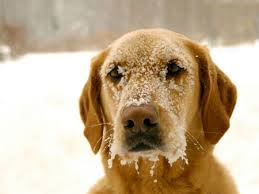|
|

Winter Pet Care
Winter weather is here! That means frigid temperatures, falling snow, and icy roads. While so many dogs love romping through the snow, there are risks to consider during this time of year. Although dogs and cats are equipped for cold weather in short spurts, they are simply not able to tolerate bitterly cold temperatures for long periods of time without some help. Please do not leave dogs or cats outdoors when the temperature drops. Regardless of the season, short-haired, very young or old dogs, and all cats should never be left outside without supervision. If you must have a pet that spends all or most of their time outdoors, consider the following necessities:
 |
Outdoor Shelter: any structure for shelter should be dry, draft-free, well-insulated, and held off the ground on blocks. If the shelter is placed directly on the frozen ground, it will be exceedingly difficult for your pet to maintain a normal body temperature. The shelter should be small enough to maintain body heat, but large enough for your pet to stand up in and turn around comfortably. Bedding is important for outdoor animals. If you are using blankets, remember to switch them out often since they can become stiff with frozen moisture and not maintain heat well. If you are using straw or another organic material, watch out for skin irritation, molds, and insect infestation. The shelter should be turned to face away from the wind, and the doorway should be covered with waterproof burlap or heavy plastic. |
 |
Fresh water: pets need a constant supply of fresh, unfrozen water at all times. At below freezing temperatures, it may be very difficult for a pet to find drinking water. Eating snow or licking ice simply does not provide enough water. Even a thin layer of ice over the water source should be broken or removed. Heated water bowls are a great idea for cold weather! Just make sure to tack down and hide cords to prevent fire hazard or electrocution. Consider using plastic, glass, or ceramic bowls, as metal bowls can cause painful wounds if your pet’s tongue becomes stuck to the bowl side. |
 |
Food: lower temperatures mean that your pet’s body has to work harder to maintain its normal body temperature. If your dog or cat lives outside, or spends a lot of time outdoors, then you will need to increase the amount of food, particularly protein, fed daily, so they will have plenty of fuel to burn. |
 |
Clothing: do not be embarrassed to dress your dog (or cat!) up in sweaters, coats, or booties. Like humans, dogs and cats can suffer from hypothermia and frostbite. Small breeds, or short-hair breeds, of dogs should only be outside for short periods of time during the colder months. Wearing a coat will lengthen the amount of time they can safely spend outdoors, making it reasonable for a walk or a trip to the dog park. Booties are also a great idea for dogs, because ice can be very sharp, and snow can hide sharp objects on the ground that your pet cannot avoid. Every winter, we treat pets for paw pad lacerations due to walking on snow & ice. |
 |
Hidden danger: when it is bitterly cold, outdoor, stray, or wild animals are going to seek out warmth wherever they can find it. It is relatively common for outdoor cats to sleep under the hoods of cars. When the motor is started, the cats can be seriously injured or killed by the fan belt. Please bang on the hood of your car or briefly honk your horn before firing up your engine, to give cats a chance to escape. |
 |
Arthritis: the colder weather may lead to more joint pain in your aging dog or cat. Additionally, surfaces slippery with snow and ice will be more challenging for a pet with arthritis, and a fall could be devastating. Most pets with arthritis will need more aggressive treatment for pain during the winter months. Please schedule an appointment today if your senior dog or cat has been slowing down lately, is stiff to rise, or hesitates at stairs or before jumping. |
 |
Microchipping: dogs and cats can easily become lost during winter months, especially during a snowstorm. Please keep cats inside, and keep dogs on a leash. If they must go out, make sure your pets are microchipped, and wearing a collar with ID tags. |
 |
Wintertime toxins: watch out for antifreeze spills from car engines! Antifreeze contains a deadly toxin called ethylene glycol and tastes temptingly sweet for dogs, cats, and even children. Even a very small amount will be deadly for your pet. Consider using products in your car that contain propylene glycol rather than ethylene glycol. Additionally, ice melt products are high in salts, and can burn your pet’s paws or cause serious complications if ingested. Wipe your pet’s paws when coming indoors to remove snow, ice balls, or ice melt products. |
|
 Bring me inside Bring me inside
|
|